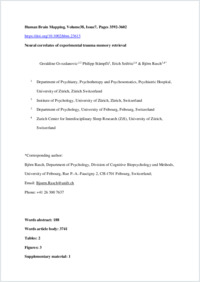Neural correlates of experimental trauma memory retrieval
- Gvozdanovic, Geraldine A. Department of Psychiatry, Psychotherapy and Psychosomatics, Psychiatric Hospital, University of Zürich
- Stämpfli, Philipp Department of Psychiatry, Psychotherapy and Psychosomatics, Psychiatric Hospital, University of Zürich
- Seifritz, Erich Department of Psychiatry, Psychotherapy and Psychosomatics, Psychiatric Hospital, University of Zürich
- Rasch, Björn Department of Psychology, University of Fribourg
-
2017
Published in:
- Human Brain Mapping. - 2017, vol. 38, p. 3592-3602
Anatomy
Radiological and Ultrasound Technology
Radiology Nuclear Medicine and imaging
Neurology
Clinical Neurolo
English
Traumatic memories such as intrusions and flashbacks play a major role in the development and maintenance of post‐traumatic stress disorder (PTSD). A thorough understanding of the neural mechanisms underlying traumatic memories is indispensable for precise diagnosis, for personalized treatment and prevention. In particular, the identification of early neural predictor variables for intrusion development shortly after trauma exposure requires detailed investigation. Experimental design: Here, we examined the neural correlates of early experimental trauma memory retrieval in a traumatic film paradigm in 42 young healthy females, using both implicit and explicit retrieval tasks. Principal observations: We show that implicit experimental trauma retrieval specifically involved the retrosplenial cortex and the anterior cingulate cortex (ACC), while both retrieval tasks resulted in trauma‐related activity in the posterior cingulate cortex (PCC) and the precuneus. Importantly, neural activity early after experimental trauma exposure predicted later intrusion development, with independent contributions from activity in the retrosplenial cortex (implicit retrieval) and the PCC (explicit retrieval). Additional analyses revealed a stronger connectivity between the bilateral amygdala and the supplementary motor area, precentral and paracentral lobule for the control group compared to the experimental trauma group. Conclusions: Our study gives new insights in the neural correlates of experimental trauma memory retrieval and their predictive value for subsequent symptom development. Our results could provide the basis for personalized early treatment and prevention of PTSD.
- Faculty
- Faculté des lettres et des sciences humaines
- Department
- Département de Psychologie
- Language
-
- English
- Classification
- Psychology
- License
-
License undefined
- Identifiers
-
- RERO DOC 323246
- DOI 10.1002/hbm.23613
- Persistent URL
- https://folia.unifr.ch/unifr/documents/306914
Statistics
Document views: 165
File downloads:
- Texte intégral: 147
